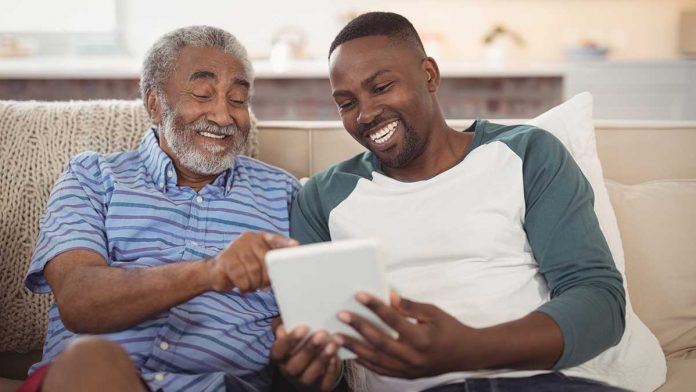COVID-19 has undoubtedly affected our lives in many ways, ranging from minor inconveniences to serious health crises. For older adults and those who provide them with care and support, the pandemic has fundamentally altered the ways in which caregivers are able to care for their loved ones.
Many individuals who provide care for an older friend or family member have had their caregiving routines significantly impacted by social distancing and stay-at-home orders. The pandemic has changed the ways that caregivers are able to interact with those they care for, especially if they do not live together. It also means that older adults, particularly those who live alone, may not have access to same support systems that they previously had.
Under normal circumstances, caregivers provide a wide array of services and supports. While some caregivers are paid professionals, most caregiving in the United States comes from unpaid “informal caregivers” including friends and family members. These informal caregivers take on responsibilities including transportation assistance, meal preparation, errands, housework and assistance with daily activities. Caregivers may also schedule medical appointments, manage finances and coordinate services from professionals.
The majority of caregiving in the United States happens within biological families, most commonly with older adults being cared for by their grown children. Caregiving in the LGBT community looks differently due to the fact that LGBT older adults are disproportionately likely to not have children, meaning that these traditional caregiving structures are often unavailable. Many LGBT elders instead rely on families of choice and networks of friends and neighbors for emotional support and assistance with activities of daily living.
Caregiving is incredibly stressful even under normal circumstances. In the time of social distancing and stay-at-home orders, the stress is heightened both for caregivers as well as those they care for. Caregivers who live with their care recipient are having to get by with fewer resources while keeping their loved one entertained, comfortable and safe. Caregivers who don’t live with their friend or family member are most often unable to provide in-person visits or support.
Checking in on an older relative or transporting a friend to a medical appointment cannot happen like it once did, particularly given the higher risk that this virus poses to older individuals. Many nursing homes and care facilities have had to restrict visitors in order to slow the spread of the virus, leaving people many isolated and vulnerable without visits from their support networks.
However, even when not in a pandemic, there are many caregiving roles that can be filled from afar. AARP estimates that more than 1 in 10 informal caregivers regularly provide care for someone who lives more than an hour away. These long-distance caregivers help with important tasks such as money management, paying bills, organizing emergency paperwork, coordinating professional services and communicating with their loved one’s doctors, social workers, home care aides and other members of a care team. Long-distance caregivers also provide essential emotional support for their loved ones through regular phone calls, emails, and video calls.
During COVID-19, more caregiving is starting to resemble the experiences of long-distance caregivers. Regardless of geographic distance, caregivers can help to set up deliveries for groceries and prescriptions, or schedule telehealth appointments. They can contact the Area Agency on Aging in their care recipients’ county (in Philadelphia, the Philadelphia Corporation for Aging: 215-765-9040) to check on the services that can help their loved one while isolated at home.
Providing emotional support and frequent communication through whatever technology is available plays a vital role in supporting a friend, relative, or loved one during a very stressful time. Sarina Issenberg, Program Director of the CARES Program at Lutheran Settlement House, advises that caregivers “take advantage of the unique opportunities and resource access this pandemic has created. There are more ways than ever to connect with people socially through virtual hangouts and support groups, to learn from online trainings, and engage in telehealth with general practitioners, specialists and mental health counselors.”
Issenberg also emphasized the importance for caregivers to monitor their own health during these stressful times, telling caregivers to “give yourself a break, take care of yourself to the extent you can and give yourself credit for all that you do.”
Caregivers have displayed great resiliency in adapting their routines to continue to provide essential care and assistance for their friends and loved ones. It is important that we show support for the people in our lives who are navigating these caregiving challenges in the face of a global pandemic.
David Griffith is the director of programs and outreach for the LGBT Elder Initiative. To learn more about the LGBT Elder Initiative, visit www.lgbtelderinitiative.org.
Ask questions, get answers about COVID-19
